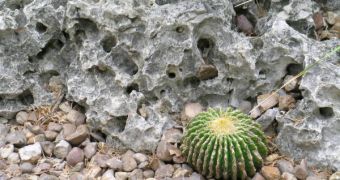The ability that cacti have, of growing directly through even the most hardened rocks on the desert floor, has amazed people since the earliest days. Their ability to drill into some of the hardest types of soil has left many speechless, and researchers have been hungry to learn how. By focusing their efforts on several species of cacti that inhabit bare rocks, scientists have been able to solve the mystery. Apparently, the plants allow some species of rock-dissolving bacteria to thrive in their roots, in a sort of symbiotic relation.
According to the report quoted by the BBC News, cacti not only permit the bacteria to permeate their roots, but they also open up pathways for the microorganisms to move into their seeds, so as to enable future generations to have a fresh start. Amazing pictures available on the Internet show cactus seeds developing in bare rocks, as bacterial agents dissolve all obstacles around.
“We were working in the desert, when we observed that many individual cacti grew in sheer rocks. They looked good and green in habitats where usually plants do not grow,” Northwestern Center for Biological Research biologist Dr. Yoav Bashan, from Mexico, says. “The only explanation that we could think of [to explain cacti growth] is involvement of microorganisms assisting the plant to grow, fixing nitrogen and dissolving mineral. We looked for them and found them,” the expert adds.
“We believe that we have found a new symbiosis between bacteria and plants. The cactus is the carbon provider for the bacteria and the bacteria indirectly provide the minerals and nitrogen for the plant,” Bashan reveals. “Consequently, below the plant is a small cave where the rocks were consumed and washed as soil and the roots are literally in the air.”
“When a seed falls in bats and bird droppings onto barren rock, it contains all the bacteria it needs to pioneer colonisation of that rock. The seed is the lucky one, as there is no other competition from other plants that do not have these bacteria. They are the pioneering plants. They formed soil in accelerated speed that otherwise will take millions of years to form,” he concludes.

 14 DAY TRIAL //
14 DAY TRIAL //